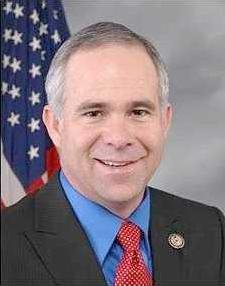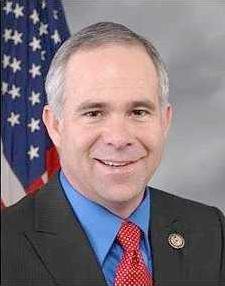What’s in it?
Here are the highlights of the proposed Cut, Cap and Balance Act of 2011, as outlined by U.S. Rep. Tim Huelskamp
Cut
Cuts total spending by $111 billion in FY 2012. The savings is divided as follows:
Reduce non-security discretionary spending below 2008 levels, which saves $76 billion.
$35 billion cut to non-veterans, non-Medicare, non-Social Security mandatory spending.
Defense budget at President’s level.
Cap
Total federal spending is scaled back based on the glide path for the fiscal years below:
2012, 22.5% of GDP.
2013, 21.7% of GDP.
2014, 20.8% of GDP.
2015, 20.2% of GDP.
2016, 20.2% of GDP.
2017, 20.0% of GDP.
2018, 19.7% of GDP.
2019, 19.9% of GDP.
2020, 19.9% of GDP.
2021, 19.9% of GDP.
Balance
Requires the passage of a Balanced Budget Amendment before raising the nation’s debt limit.
Provides for the President’s request for a debt ceiling increase if a qualifying Balanced Budget Amendment passes Congress and is sent to the states for ratification.
WASHINGTON, D.C. — U.S. Rep. Tim Huelskamp (R-Kansas) expressed confidence Tuesday morning that the House would pass the "Cut, Cap, Balance" bill before the end of the day. The measure cuts $111 billion from next year’s budget and provides for a debt ceiling increase only if a Balanced Budget Amendment passes Congress and is sent to the states for ratification.
"There are no immediate cuts to the entitlement programs," Huelskamp said. "The defense levels are exactly what the president requested." The bill passed by a vote of 234-190.
Huelskamp, an original cosponsor of Cut, Cap and Balance, said $111 billion could be cut from the projected $3.6 trillion budget without making any changes to Social Security, Medicare or money spent on veterans. Defense spending would remain at the same level as the House-passed budget for fiscal year 2012.
"This savings total meets the promise to enact immediate spending cuts as part of any debt ceiling bill, and would cause the deficit to finally get back down below $1 trillion next year — a reduction to the previous year’s deficit of more than $400 billion," he said.
The Associated Press reports roughly two-thirds of the cuts would come from department and agency budgets, and one-third from automatically paid benefits, but decisions about which programs would be cut would be left to Congress. The proposal also decreases, or "caps," spending over the coming decade, from 24.1 percent of the economy this year to 19.9 percent in 2021. Next year, spending would be capped at 22.5 percent of gross domestic project. Over the decade, the cap would mean about $6 trillion less spending than President Barack Obama proposed in his most recent budget.
Huelskamp did not have specifics on how budget cuts would affect his Congressional district, but said as an example it would reduce federal spending on agriculture by $2 billion. "The cuts will be real; they have to have an impact," he said.
"This would place spending in line with average spending over the last 30 years."
To meet the requirements of Cut, Cap and Balance, the Balanced Budget Amendment would have to include a limit on spending as a percentage of GDP, and require a two-thirds "super majority" vote in Congress to raise taxes. Although three-fourths of the 50 states would have to ratify an amendment for it to become law, sending the amendment to the states would automatically trigger the $2.4 trillion debt ceiling increase the president has requested.
Huelskamp’s office noted there are a couple of versions of a Balanced Budget Amendment out, and one could be voted on next week. That would leave time to meet the looming deadline for meeting current U.S. debt obligations.
The Treasury warns the U.S. will face default if the cap is not raised by Aug. 2, but Huelskamp and other Republicans say the deadline is not firm and the Treasury Department has refused to provide specific information. "We’re concerned about the economy — the downgrading of our U.S. credit rating," he said, but the congressman believes a lack of structural reform poses the biggest threat to the nation’s credit worthiness.
"A debt limit increase of this magnitude is a major sacrifice on the part of House Republicans, which is why it is made contingent on measures to ensure that the federal budget is permanently under control," Huelskamp said.
As a freshman Congressman representing the First District of Kansas, Huelskamp serves on the House Budget, Agriculture, and Veterans’ Affairs Committees. He is also a member of the House Republican Study Committee.
In visiting with Kansans at town hall meetings, Huleskamp said he has heard one message over and over: "‘We don’t care about the next election, Tim; we care about the next generation.’ If you’re going to raise the debt ceiling, it has to be coupled with a long-term plan."
Although members of the House were confident that Cut, Cap and Balance would pass their branch of Congress, the president has said he would veto such a plan if it makes it to his desk. The Senate has yet to unveil its debt limit compromise. "I would like to see it brought up to a vote (in the Senate)," Huelskamp said. "Harry Reid (D-Nev., majority leader of the Senate) won’t bring things to a vote."





